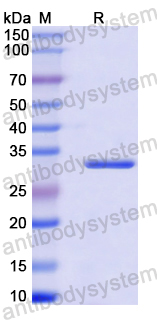Catalog No.
YHB22901
Expression system
E. coli
Species
Homo sapiens (Human)
Protein length
Asp90-Leu358
Predicted molecular weight
33.84 kDa
Nature
Recombinant
Endotoxin level
Please contact with the lab for this information.
Purity
>90% as determined by SDS-PAGE.
Accession
O75503
Applications
ELISA, Immunogen, SDS-PAGE, WB, Bioactivity testing in progress
Form
Lyophilized
Storage buffer
Lyophilized from a solution in PBS pH 7.4, 0.02% NLS, 1mM EDTA, 4% Trehalose, 1% Mannitol.
Reconstitution
Reconstitute in sterile water for a stock solution. A copy of datasheet will be provided with the products, please refer to it for details.
Shipping
In general, proteins are provided as lyophilized powder/frozen liquid. They are shipped out with dry ice/blue ice unless customers require otherwise.
Stability and Storage
Use a manual defrost freezer and avoid repeated freeze thaw cycles. Store at 2 to 8°C for frequent use. Store at -20 to -80°C for twelve months from the date of receipt.
Alternative Names
Protein CLN5, Ceroid-lipofuscinosis neuronal protein 5, CLN5
Syndromic forms of inherited retinal dystrophies: a comprehensive molecular diagnosis of consanguineous Pakistani families using capture panel sequencing., PMID:40384762
Genetic aetiologies in relation to response to the ketogenic diet in 226 children with epilepsy., PMID:40290421
Revealing the mechanism of Sanfu Patch dorsal application for alleviating OVA-induced asthma: an integrated approach combining TMT quantitative proteomics and molecular docking., PMID:40280374
Mendelian randomization identifies proteins involved in neurodegenerative diseases., PMID:40037332
Drug-refractory epilepsy due to a novel CLN5 mutation: A report of three patients from an Indian family., PMID:39667065
Functionally overlapping intra- and extralysosomal pathways promote bis(monoacylglycero)phosphate synthesis in mammalian cells., PMID:39548099
Adult-Onset Neuronal Ceroid Lipofuscinosis: CLN5 Variant Presenting as Focal Dystonia., PMID:39525553
Mechanisms regulating the intracellular trafficking and release of CLN5 and CTSD., PMID:38272448
Characterization of two human induced pluripotent stem cell lines derived from Batten disease patient fibroblasts harbouring CLN5 mutations., PMID:38141358
Mechanistic Insights into S-Depalmitolyse Activity of Cln5 Protein Linked to Neurodegeneration and Batten Disease: A QM/MM Study., PMID:38055807
Efficacy of dual intracerebroventricular and intravitreal CLN5 gene therapy in sheep prompts the first clinical trial to treat CLN5 Batten disease., PMID:37942487
The Batten disease gene product CLN5 is the lysosomal bis(monoacylglycero)phosphate synthase., PMID:37708259
Characterization of neuropathology in ovine CLN5 and CLN6 neuronal ceroid lipofuscinoses (Batten disease)., PMID:37246363
Clinical and genetic characterization of neuronal ceroid lipofuscinoses (NCLs) in 29 Iranian patients: identification of 11 novel mutations., PMID:37074398
Does the Blood-Brain Barrier Integrity Change in Regard to the Onset of Fetal Growth Restriction?, PMID:36768287
An altered transcriptome underlies cln5-deficiency phenotypes in Dictyostelium discoideum., PMID:36437924
Molecular Indicators of Blood-Brain Barrier Breakdown and Neuronal Injury in Pregnancy Complicated by Fetal Growth Restriction., PMID:36430274
Novel CLN5 Mutation in Neuronal Ceroid Lipofuscinosis Type 5., PMID:36411198
Lysosomal dysfunction, autophagic defects, and CLN5 accumulation underlie the pathogenesis of KCTD7-mutated neuronal ceroid lipofuscinoses., PMID:36368077
HAGLROS knockdown restrained cell proliferation, migration and invasion and facilitated apoptosis in laryngeal cancer via miR-138-5p/CLN5 axis., PMID:36347825
Blood-Brain Barrier Disintegration in Growth-Restricted Fetuses with Brain Sparing Effect., PMID:36293204
KCTD7 mutations impair the trafficking of lysosomal enzymes through CLN5 accumulation to cause neuronal ceroid lipofuscinoses., PMID:35921411
Lysosomal Proteomics Links Disturbances in Lipid Homeostasis and Sphingolipid Metabolism to CLN5 Disease., PMID:35681535
Cln5 represents a new type of cysteine-based S-depalmitoylase linked to neurodegeneration., PMID:35427157
Natural history of retinal degeneration in ovine models of CLN5 and CLN6 neuronal ceroid lipofuscinoses., PMID:35256654
M1 macrophages impair tight junctions between endothelial cells after spinal cord injury., PMID:34995751
SlpB Protein Enhances the Probiotic Potential of L. lactis NCDO 2118 in Colitis Mice Model., PMID:34987390
Appearance of claudin-5+ leukocyte subtypes in the blood and CNS during progression of EAE., PMID:34933669
Deficiency of the Lysosomal Protein CLN5 Alters Lysosomal Function and Movement., PMID:34680045
A novel CLN5 mutation in Turkish patient with variant late-onset neuronal ceroid lipofuscinosis and recurrent fractures that causes severe morbidity., PMID:34678132
Aberrant Autophagy Impacts Growth and Multicellular Development in a Dictyostelium Knockout Model of CLN5 Disease., PMID:34291044
Visual system pathology in a canine model of CLN5 neuronal ceroid lipofuscinosis., PMID:34216614
CLN5 and CLN3 function as a complex to regulate endolysosome function., PMID:34060589
Intravitreal gene therapy protects against retinal dysfunction and degeneration in sheep with CLN5 Batten disease., PMID:33930398
A lysosomal enigma CLN5 and its significance in understanding neuronal ceroid lipofuscinosis., PMID:33792748
Urine proteomics analysis of patients with neuronal ceroid lipofuscinoses., PMID:33532713
Hereditary Systemic Diseases Can Have a Predominant Ocular Phenotype, but They Are Still Systemic Diseases., PMID:33507226
Association of the Recurrent Rare Variant c.415T>C p.Phe139Leu in CLN5 With a Recessively Inherited Macular Dystrophy., PMID:33507209
Differential Profile of Systemic Extracellular Vesicles From Sporadic and Familial Alzheimer's Disease Leads to Neuroglial and Endothelial Cell Degeneration., PMID:33281599
Neuronal Ceroid Lipofuscinosis: Potential for Targeted Therapy., PMID:33242182
CLN5 in heterozygosis may protect against the development of tumors in a VHL patient., PMID:32487141
A novel pathogenic frameshift variant unmasked by a large de novo deletion at 13q21.33-q31.1 in a Chinese patient with neuronal ceroid lipofuscinosis type 5., PMID:32393339
Novel likely disease-causing CLN5 variants identified in Pakistani patients with neuronal ceroid lipofuscinosis., PMID:32302805
Proteomic and functional analyses in disease models reveal CLN5 protein involvement in mitochondrial dysfunction., PMID:32257390
Mfsd8 localizes to endocytic compartments and influences the secretion of Cln5 and cathepsin D in Dictyostelium., PMID:32087303
Autosomal-dominant adult neuronal ceroid lipofuscinosis caused by duplication in DNAJC5 initially missed by Sanger and whole-exome sequencing., PMID:31919451
Loss of Cln5 leads to altered Gad1 expression and deficits in interneuron development in mice., PMID:31294445
Next-Generation Sequencing Analysis Reveals Novel Pathogenic Variants in Four Chinese Siblings With Late-Infantile Neuronal Ceroid Lipofuscinosis., PMID:31105743

